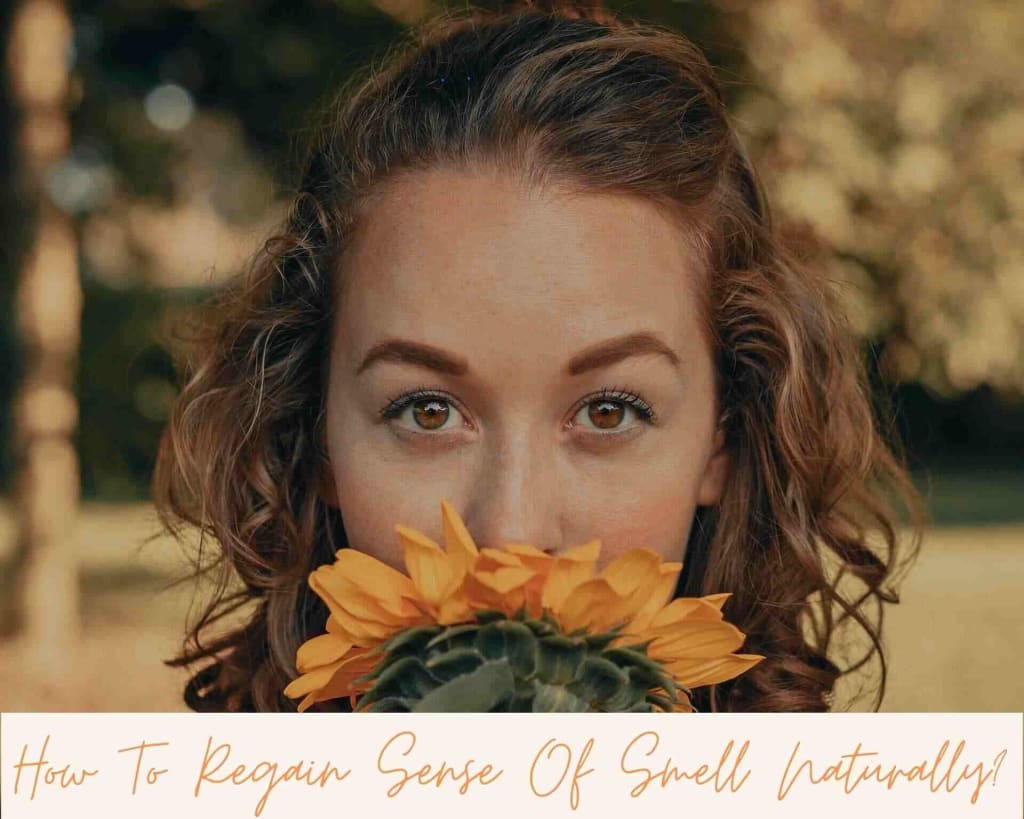How To Regain Sense Of Smell Naturally
Try This Home Remedies

Introduction
Sense is a vital part of human life. Sometimes we have lost the sense of smell. But how to regain sense of smell naturally? You can characterize a sense as how the body sees the outside world; one of the resources of sight, smell, hearing, taste, and contact.
Sense is a natural structure, an organic part of the feeling, and the most common way to gather information about the world and give answers.
(For instance, in the human body, the brain, which is part of the central nervous system, gets signals from the faculties, which ceaselessly get information from the environment, decipher these signs, and make the body respond physically or chemically).
During sensation, receptors gather different improvements (like a sound or smell) for transduction, meaning change into a structure that the mind can figure out. Sense and discernment are essential to almost every part of a living thing's understanding, acting, and thinking.
The five senses are the eyes, ears, tongue, nose, and skin. In this article, I'll focus on the sense of smell and talk about "How to regain sense of smell naturally"
Before I dive into the topic properly, let me discuss a few terms:
Common terms used in the sense of smell
- Regain
To get back to using something, particularly quality or ability after it has been lost.
- Sense of smell
The sense of smell, also known as olfaction, is a specialized sense that allows for the perception of smells (also known as odors).
The specialized name of molecules that actuate the feeling of smell is olfaction. They enter through the nose and mouth and bind to back-of-nose receptor cells. In people, there are a great many such cells.
However, there are only a few hundred (400 is a good estimate) different olfactory receptors. Unlike other senses, smell's receptor cells are neurons. Each olfactory receptor cell possesses cilia fibers with receptors specific to the molecules with which they interact.
In addition, the cell projects what is known as an axon, which is a more robust fiber. Neurons do this. The olfactory nerve is where the axons converge and travel directly to the brain.
When a fundamental particle, or odorant, joins with an olfactory receptor, it creates a bit of electrical motivation. As these flows enter the brain's complicated network, it can quickly pick up on the smell.
What number of smells might the human mind at any point separate? Up to this point, most researchers would have offered something like 10,000; be that as it may, the new examination recommends a far more prominent number, maybe a trillion.
No one knows how this could be possible with only 400 types of receptor cells sending messages, which shows how powerful the mind is.
The olfactory bulb likewise interfaces straightforwardly with the limbic framework, the cerebral region that directs feelings. To this end, a scent might set off almost immediate sensations of dread or desire before you even become entirely mindful of what you are smelling.
An organization of associations with different pieces of the cerebrum enables fragrances to bring out nitty gritty, sincerely charged recollections and such complex mental states as wistfulness and yearning.
The feeling of smell plays an essential part in tracking down food, segregating it from harmful substances, valuing its flavor, and, as well, bringing about the desire to either eat the food or not.
- Loss of smell (Anosmia)
Anosmia is the fractional or complete loss of the feeling of smell. This misfortune might be brief or long-lasting. Specific circumstances that disturb the nose's coating, like sensitivities or a cold, can prompt transitory anosmia.
More difficult circumstances that influence the mind or nerves, like cerebrum growth or head injury, can cause super durable loss of smell.
Individuals with anosmia will most likely be unable to taste food varieties completely and may lose interest in eating. This can prompt weight loss or hunger. Anosmia can likewise prompt sadness since it might weaken one's capacity to smell or taste pleasurable food sources.
Anosmia is habitually brought about by an expanding or blockage in the nose that keeps scents from reaching the nose's highest point. An issue sometimes brings about anosmia with the framework that conveys messages from the nose to the brain.
Causes of loss of smell (anosmia)
A few distinct variables bring about a loss of smell. However, the most widely recognized reason for anosmia is nasal congestion from a cold, sensitivity, sinus disease, or poor air quality. Other anosmia causes include
1. Inherited loss of smell
This is because of an unformed substance-detecting framework. The synthetic detecting framework doesn't deliver the atoms that convey the messages to the particular piece of the mind where scents are recognized.
The olfactory nerve is a convoluted little nerve framework situated in a fix of tissue in the highest portion of the nose. This neural framework is associated straightforwardly with the cerebrum. If the fixation of nerves is immature or harmed, an individual can lose their sense of smell.
2. Aging
As individuals age, their sense of smell diminishes. The environment dulls taste and smell receptors. The elderly's declining sense of smell causes poor nutrition. Individuals may also lose the capacity to distinguish between various scents.
Specialists suggest that potential reasons a few more established grown-ups may lose their sense of smell include: diminished nerve strands and receptors in the olfactory bulb; a piece of the mind liable for handling fragrance; loss of tactile cells in the nose; decay in the focal sensory system, mental handling capabilities.
3. Nasal polyps
Noncancerous nose and sinus growths block the nose—an injury to the nose and smelling nerves from a medical procedure or head injury.
Other causes are
- Contact with poisonous synthetics, like pesticides or solvents.
- Specific ailments, like Alzheimer's illness, Parkinson's sickness, numerous sclerosis, dietary lacks, and hormonal imbalance.
Natural Remedies For Regain Sense Of Smell Naturally
Despite the severity of the factor that causes the loss of smell, you can adopt many homely and healthy natural practices to remedy the situation. Below are some recommended natural remedies that can combat loss of smell (Anosmia) in our homes:
1. Lemon
The water with lemon and honey is ready to drink. This refreshment smells good. Lemons are acidic and abundant in L-ascorbic acid and show antimicrobial action. Its robust and trademark scent and chemical composition may assist in diminishing disease that causes an impeded/runny nose and enhance your sense of smell.
- Requirement:
- ½ lemon
- 1 glass of water
- (optional) Honey
- Method:
- Add lemon juice to water.
- Add honey to it and blend well.
- Drink the liquid right away.
- Drink twice daily before meals.
Note: Not for throat infection patients.
2. Garlic
Garlic compounds are rich in antimicrobial and anti-inflammatory activities. This can assist with treating a blocked nose, easing cold and influenza-like side effects. This, thus, may help you with breathing more simpler and alleviate your sense of smell
- Requirements
- You Will Need
- 2-3 hacked garlic cloves
- 1 cup of water
- Method
- In a pot, boil water.
- Add the hacked garlic cloves and stew for a couple of moments.
- Drink the tea.
- You can drink this two times every day.
3. Castor oil
The ricinoleic corrosive in castor oil grants it mitigating solid properties. Castor oil in the form of nasal drops can help ease the symptoms of a cold or flu, like swelling and irritation, and restore your sense of smell.
- Requirement
- 1 teaspoon of warmed cold-squeezed castor oil
- Method
- Put warm castor oil in your noses.
- Drink twice daily.
4. Ginger
Use ginger as a solution for loss of smell. The warming properties of ginger can assist in treating colds. Ginger has a strong smell that can wake up your sense of smell, and its taste can wake up your sense of taste.
Take a piece of stripped ginger and bite it gradually. Begin by biting the ginger piece at standard stretches—little bits of stripped ginger.
- Do this every day.
Note: Too much ginger can cause throat irritation, heartburn, and diarrhea.
5. Cayenne Pepper
Capsaicin, found in cayenne pepper, is known to unblock nasal passages and relieve congestion. As a result, this may be of some assistance to you in regaining your sense of smell.
- Requirement
- 1 tsp cayenne
- 1tsp honey
- 1cup warm water
- Method
- Mix honey and cayenne pepper in a glass of water.
- Drink. You should probably limit yourself to drinking this once every few days.
Note: Large amounts of cayenne pepper can cause stomach aches. Consult a doctor before using this remedy if you take hypertension medication.
6. Apple Juice + Vinegar
Apple juice with vinegar shows antimicrobial and mitigating properties. This could help fight off microorganisms that cause infections and clear up stuffy noses, making them easier to smell.
- Requirement
- 1tsp apple juice vinegar
- 1-cup water
- (Optional) honey
- Method
- Warm water with 1 tablespoon of apple juice vinegar.
- Add honey to taste.
- Blend and drink it.
- Drink once a day.
Note: Apple juice vinegar that has not been diluted can wear down tooth enamel, upset the stomach, and raise potassium levels.
7. Carom Seeds
Carom seeds have mitigating properties that can assist in wiping out nasal blockage. This improves odor.
- Requirement
- 1 tablespoon of carom seeds
- A little muslin fabric
- Method
- Put carom seeds in muslin.
- Tie the fabric and breathe in severe areas of strength for the carom seeds.
- Do this regularly.
8. Cinnamon
Cinnamon as a solution for loss of smell. Cinnamon has mitigating and antimicrobial properties. This might assist in lessening any disease that causes a nasal blockage, consequently improving your sense of smell.
- Requirement
- 1/2 tsp cinnamon
- 1tsp honey
- Method
- Mix cinnamon powder and honey.
- Leave glue on the tongue for 10 minutes.
- Do this every day.
Note: Cinnamon can cause mouth wounds if misused. Use this remedy only as directed.
9. Peppermint
Menthol, the principal constituent of peppermint leaves, has calming and antimicrobial properties. These can assist with easing the side effects of cold and influenza that may disturb your sense of smell.
- Requirement
- 10-15 peppermint leaves
- 1 cup of water
- Honey
- Method
- Add 10 to 15 peppermint passes on to some water.
- Boil in a pot.
- Cook and then strain.
- Add honey to tea when it cools and drink.
- Two times a day, have mint tea.
10. Curry Leaves
Curry leaves are anti-inflammatory, say, researchers. This could help ease the irritation caused by a cold or flu, which can make it hard to breathe through your nose and make you lose your sense of smell.
- Requirement
- 10-15 curry leaves
- 1 glass of water
- Method
- In a glass of water should add 10 to 15 curry leaves.
- They must sit undisturbed for at least half an hour.
- Consume the mixed drink.
- Drink this two times every day.
11. Eucalyptus Oil
The mitigating and mucolytic properties of eucalyptol assist with freeing side effects from upper respiratory illnesses that might have set off the deficiency of smell.
Note: Extreme inward breath of undiluted fumes of eucalyptus oil can cause dizziness, stomach upset, sickness, shortcomings, and so forth. Subsequently, ensure you adhere to the amount stated above.
Try sighing inwardly.
Keep up with great oral cleanliness. Try as much as possible to avoid diseases like cold and flu - one of the primary causes of smell deficiency.
Conclusion
Lastly, we end our blog on "how to regain a sense of smell naturally". Also, this post explains how to get taste and smell back. The scent of so many things can bring joy and pleasure.
For some people, everyday experiences can be improved by the smell of good food, the air in the country, or sensual moments.
When people lose their sense of smell, their quality of life may decline. As such, it is pertinent for our sense of smell to be intact for healthy living.
Using the above remedies can help restore your sense of smell. The good thing is that you can go with medications to regain the sense of smell after COVID in the comfort of your house, and they are all from natural sources or practices.
FAQs related to “How To Regain Sense Of Smell Naturally”
Q: Is it possible to get sick from environmental odors?
Ans. Yes, it is. Everyone has different reactions to odors. Some are more sensitive, while others are less sensitive. Environmental odors are odors obtained from the environment. There are lots of substances that cause environmental odors. Therefore, any person sensitive to environmental odors will get sick and might have a loss of smell.
Q: Are there types of smell loss?
Ans. Viral colds can destroy smell receptor cells. Rhinitis can block odor molecules from reaching smell receptors or impair their detection. A head injury can damage smell-processing brain areas or olfactory nerve fibers. Aging: Airborne toxins can destroy olfactory receptors and impair cell regeneration. Genetic or inborn causes: It is currently unknown.
Q: Is there medication for smell loss?
Ans. Yes, there are medications like antibiotics or surgical operations. Most times, it is essential to use some natural remedies for smell loss, such as; Ginger, Garlic, Castor oil, Curry leaves, Apple juice, etc
Q: Does smell loss increase my risk of Alzheimer's or Parkinson's?
Ans. Unexpected smell loss, like hereditary and aging, does not increase Alzheimer's or Parkinson's risk.
Q: What if my kid has lost his smelling senses?
Ans. Anosmia is a disability that can't be seen, so it's often not found until a child starts school and hears other kids talk about feelings they don't understand. First, see an otolaryngologist rule out the possible cause of the blockage or nasal inflammation.
Q: What are some smell loss effects?
Ans. The loss of smell makes detecting fire, gas, or smoke difficult.
Q: Why don't doctors treat smell loss?
Ans. Anosmia is a hidden disability. A lot of people don't appreciate their smell sense until it's gone. Thus, doctors struggle to comprehend anosmia's debilitating effects. However, we described how to regain the sense of smell naturally in this guide.
Q: Can my kids lose their smelling senses?
Ans. Genetic loss of smell seems rare, and different subtypes are passed down at different rates. Without knowing the genetic cause, we can't tell if your children will inherit smell loss.
About the Creator
Always Ful
Always Ful loves to share information on Health, Fitness, Lifestyle, Drinks, Fashion, Food, and Technology.
Enjoyed the story? Support the Creator.
Subscribe for free to receive all their stories in your feed. You could also pledge your support or give them a one-off tip, letting them know you appreciate their work.






Comments
There are no comments for this story
Be the first to respond and start the conversation.